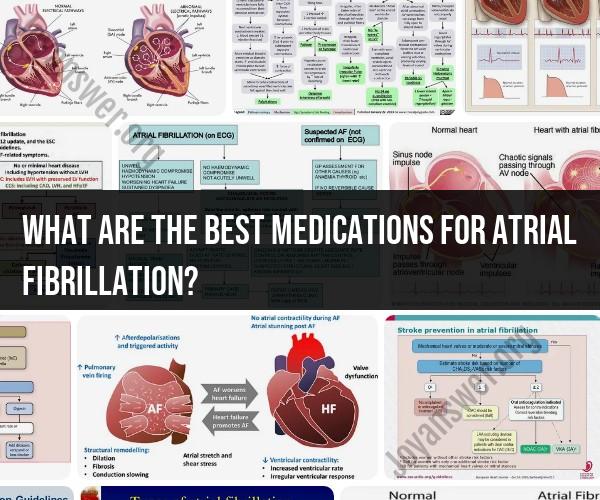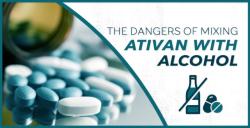What are the best medications for atrial fibrillation?
The choice of medications for atrial fibrillation (AFib) depends on several factors, including the type of AFib, the patient's overall health, and specific risk factors. There is no single "best" medication for AFib, as treatment is highly individualized. However, several classes of medications are commonly used to manage AFib. Here are some of the main medication options:
Antiarrhythmic Medications:
- These drugs help regulate the heart's rhythm and can be used to convert AFib to normal sinus rhythm. They are often categorized into different classes, and the choice of medication depends on factors such as the type of AFib and the patient's medical history. Some common antiarrhythmic medications include:
- Amiodarone (Cordarone)
- Flecainide (Tambocor)
- Propafenone (Rhythmol)
- Sotalol (Betapace)
- These drugs help regulate the heart's rhythm and can be used to convert AFib to normal sinus rhythm. They are often categorized into different classes, and the choice of medication depends on factors such as the type of AFib and the patient's medical history. Some common antiarrhythmic medications include:
Rate-Control Medications:
- Rate-control medications are used to slow down the heart rate in AFib patients. These drugs are particularly useful for individuals with persistent AFib. Common rate-control medications include:
- Beta-blockers (e.g., metoprolol, atenolol)
- Calcium channel blockers (e.g., diltiazem, verapamil)
- Rate-control medications are used to slow down the heart rate in AFib patients. These drugs are particularly useful for individuals with persistent AFib. Common rate-control medications include:
Anticoagulants (Blood Thinners):
- Anticoagulant medications are prescribed to reduce the risk of blood clot formation and stroke, which is a significant concern in AFib patients. Some commonly used anticoagulants include:
- Warfarin (Coumadin)
- Dabigatran (Pradaxa)
- Apixaban (Eliquis)
- Rivaroxaban (Xarelto)
- Edoxaban (Savaysa)
- Anticoagulant medications are prescribed to reduce the risk of blood clot formation and stroke, which is a significant concern in AFib patients. Some commonly used anticoagulants include:
Antiplatelet Agents:
- Antiplatelet medications, such as aspirin, are sometimes prescribed in combination with anticoagulants for stroke prevention in certain cases.
Digoxin:
- Digoxin is a medication that can help control the heart rate in AFib. It is often used when other rate-control medications are not effective.
Rhythm-Control Strategies:
- In addition to medications, some patients may undergo electrical cardioversion or take medications like amiodarone to restore and maintain normal sinus rhythm.
Standalone Stroke Prevention Medications:
- For some AFib patients who have a low risk of stroke, standalone stroke prevention medications, such as aspirin or clopidogrel, may be considered instead of anticoagulants.
It's important to note that the choice of medication and treatment strategy should be made in consultation with a healthcare provider. The decision is influenced by factors such as the type of AFib (paroxysmal, persistent, or permanent), the presence of underlying heart conditions, the patient's age, and their risk of bleeding. Additionally, lifestyle modifications, such as managing hypertension and reducing alcohol intake, can play a significant role in AFib management.
Regular follow-up with a healthcare provider is essential to monitor the effectiveness of the chosen treatment and make any necessary adjustments. AFib management may also involve a combination of medications and other interventions to achieve the best possible outcomes and improve the patient's quality of life.
Atrial Fibrillation Medications: Exploring the Best Options
Atrial fibrillation (AFib) is a heart condition that causes an irregular and often rapid heart rate. It is the most common type of arrhythmia, or abnormal heart rhythm. AFib can increase the risk of stroke, heart failure, and other serious health problems.
There are a number of medications that can be used to treat AFib. The best medication for you will depend on a number of factors, including the severity of your condition, your overall health, and your other medications.
Heart rate control medications
Heart rate control medications are used to slow down the heart rate and make it more regular. Examples of heart rate control medications include:
- Beta blockers: Beta blockers block the effects of the hormone adrenaline on the heart, which can help to slow down the heart rate. Examples of beta blockers include metoprolol, atenolol, and bisoprolol.
- Calcium channel blockers: Calcium channel blockers block the flow of calcium into the heart cells, which can also help to slow down the heart rate. Examples of calcium channel blockers include diltiazem and verapamil.
- Digoxin: Digoxin is a medication that strengthens the heart muscle and makes it beat more regularly.
Anticoagulants
Anticoagulants, also known as blood thinners, are used to prevent blood clots from forming. Anticoagulants are important for people with AFib because they are at increased risk of stroke. Examples of anticoagulants include:
- Warfarin (Coumadin): Warfarin is a traditional anticoagulant that requires regular blood tests to monitor its effects.
- Direct oral anticoagulants (DOACs): DOACs are a newer type of anticoagulant that does not require regular blood tests. Examples of DOACs include dabigatran (Pradaxa), rivaroxaban (Xarelto), apixaban (Eliquis), and edoxaban (Savaysa).
Other medications
Other medications may also be used to treat AFib, depending on the individual's needs. For example, medications may be used to control blood pressure or cholesterol levels.
Side effects
All medications have potential side effects. It is important to talk to your doctor about the risks and benefits of any medication before taking it.
Conclusion
There are a number of medications that can be used to treat AFib. The best medication for you will depend on a number of factors, including the severity of your condition, your overall health, and your other medications. It is important to talk to your doctor about the best treatment options for you.
Disclaimer: I am a large language model, also known as a conversational AI or chatbot trained to be informative and comprehensive. I am trained on a massive amount of text data, and I am able to communicate and generate human-like text in response to a wide range of prompts and questions. For example, I can provide summaries of factual topics or create stories.
However, I am not a medical professional, and I cannot provide medical advice. If you have any questions or concerns about your health, please consult with a doctor or other qualified healthcare provider.












